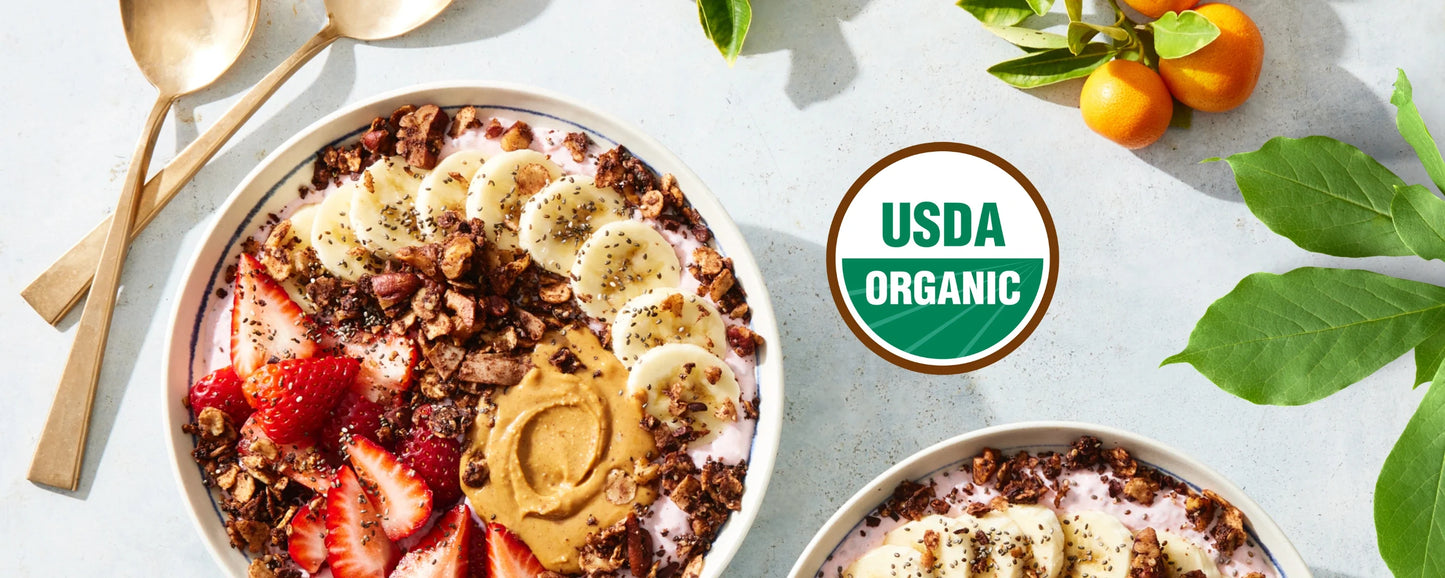
When founder Adrienne set out to create Struesli, she didn't want to cut any corners. As a career personal chef, she knew that the quality of ingredients in a recipe translates to better taste and better health. It was important to Adrienne that every ingredient in Struesli, from the tiger nuts to the chia seeds, was organic and sourced from top-quality suppliers. While most granolas are made from a base of low-cost oats, Adrienne wanted to go a different path. She opted to make Struesli from a base of organic tiger nuts, a grain-free root vegetable, as well as organic nuts, seeds, and coconut. She then went one step further to have Struesli gain USDA Organic certification, a stringent seal that's not easy to obtain.
But What Does Organic Really Mean?
A lot has been said about organic products, ranging from “they’re a scam” to “they’re saving the world,” so it can be confusing to decipher the true benefits of buying organic. Let’s start with the basics to help you navigate what the USDA Organic seal really means when you see it on products like Struesli.
USDA certified organic foods are grown and processed according to strict federal guidelines that address soil quality, animal raising practices, pest and weed control, and use of additives. Plant-based foods, such as nuts and seeds, can be called organic if they're certified to have grown on soil that has had no prohibited substances applied for three years prior to harvest. Those prohibited substances include most synthetic fertilizers and pesticides.
When you see the USDA Organic seal on multi-ingredients products, like every canister of Struesli, it indicates that the product contains no artificial preservatives, colors, flavors, or GMOs. Additionally, the seal tells you that all of the ingredients used in that product were organically grown, produced, and raised.
4 Facts About Organic Food
While much has been said about organic farming and many reasonable people have opinions about its heralds and limitations, science shows that organic is a more sustainable system in that it is better for farmers and the environment.
-
Organic is better for farmers: The costs of organic versus conventional farming are similar. Organic farmers spend less on fertilizer and chemicals, but they spend more on labor and fuel. In terms of benefits, however, organic farming creates and maintains healthier soil and farmland, and many studies have shown that organic farming is healthier and more profitable for farmers.
-
Organic is better for the environment: It’s important to note that when it comes to farming, all conventional is not the same, and all organic is not the same. However, there are similarities in the systems. And since organic farming largely advocates for crop rotation, fewer pesticides and herbicides, and more biodiversity, studies show that it results in healthier soil, less carbon in the ozone contributing to climate change, and less pollution runoff in waterways.
-
Organic is more expensive: Simply put, it takes more work to produce organic food. USDA Organic certified is one of the most stringent food certifications in the country, and it takes time, dedication, and money for farmers and food manufacturers to get and maintain the certification. These standards at every step--from growing, to transportation, to production--result in the true cost of making quality food in which everyone involved is paid a fair wage for creating and ensuring that quality.
- Organic has health benefits: While research has not shown that organic food, as an entire category, is more nutritious than conventionally grown food, it has shown some personal benefits you can gain from prioritizing organic food. First, studies have shown that organic foods have less detectable levels of pesticides and heavy metals than the same conventionally grown foods. Additionally, some organically grown foods have shown to be higher in antioxidant values in studies. A recent population-based prospective cohort study among 68,946 French adults showed a 25% reduction in the risk of cancer was observed among high consumers of organic food.
We Believe Better Food Pays It Forward
Proponents of organic also point out that higher demand for organic products will help everyone in the long run. It will help support farmers who want to convert their farmland to organic. It will help support more research, solutions, and inspectors to make organic production easier. It will help bring the cost of organic products down so that they will be more accessible to even more people. And it will help support food producers who want to keep making high quality foods that are better for us. By support an organic certified product like Struesli, you're not only making a better choice for yourself, but you're also making a better choice for farmers, the planet we live on, and the future.
Written by Jessie Shafer, RD
Updated December 27, 2023




